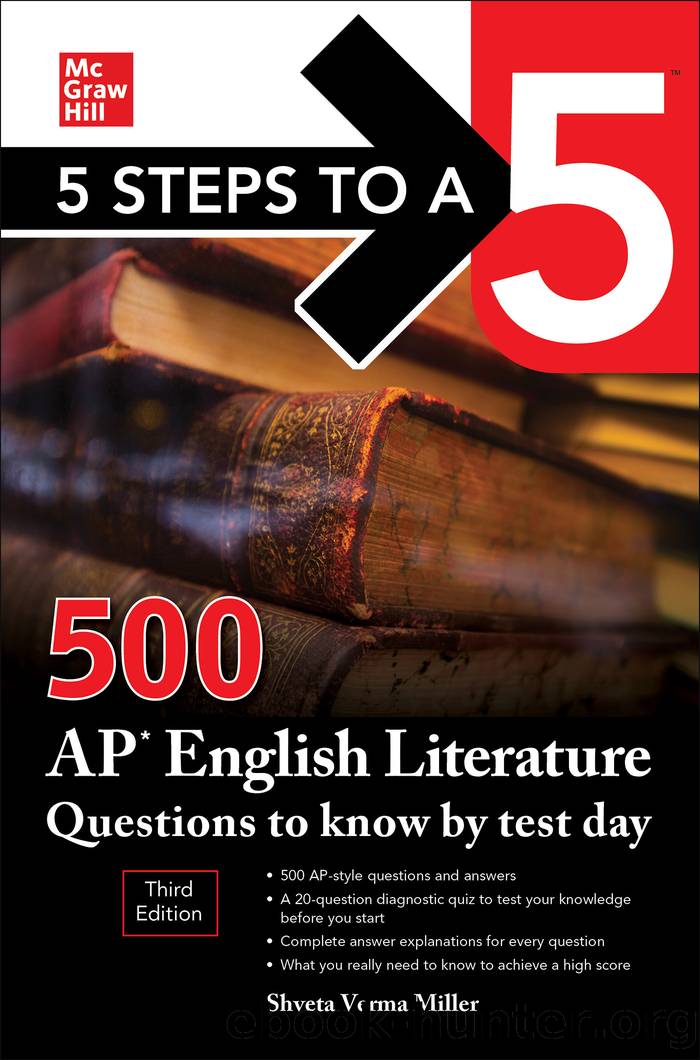5 Steps to a 5: 500 AP English Literature Questions to Know by Test Day by Shveta Verma Miller

Author:Shveta Verma Miller
Language: eng
Format: epub
Publisher: McGraw-Hill Education
Published: 2021-06-15T00:00:00+00:00
Chapter 2: 20th-Century/Contemporary Prose
Passage 15. Maya Angelou, I Know Why the Caged Bird Sings
153. (C) The verbs describe the actions that âheld a simple kind of adventureâ (2) for the narrator. Serving customers in a store may not seem like a typical adventure, but the narrator uses precise verbs to portray the careful and judicious process she uses to prepare the customersâ orders. The adventure is then described to be the slight risk of accidentally making an error âin the Storeâs favor,â which would lead to her âquietly but persistentlyâ (9) punishing herself. By listing each action she takes, the narrator presents an image of a deliberate process. Choice D is incorrect because the narrator does perceive the process as part of an adventure. Choice A is incorrect because the intention of these specific verbs is not to convince the reader that the actions are truthful, but to convey the careful and risky process of accurately preparing customersâ orders.
154. (E) The process of accurately preparing a customerâs order is described as âa simple kind of adventureâ (2). The rest of the paragraph suggests the adventure lies in the slight risk of accidentally making an error âin the Storeâs favorâ (7). Her careful measuring might lead to appreciation and admiration from the customers, or reprimandsâwhich would lead to her âquietly but persistentlyâ (9) punishing herself.
155. (A) The narrator takes such great care to accurately measure the customersâ orders and earn their appreciation and admiration (see question 153). When her efforts lead to mistakes in the Storeâs favor, she punishes herself for her lack of judgment by denying herself her most cherished treats. She elaborates on her choice of punishment in the third paragraph by explaining exactly how âsacredâ (20) the sweet pineapple treat was to her, which suggests she chose punishments that were uniquely suited to her alone. These punishments may be overly severe (D), but the intention is to describe them as appropriately chosen by the narrator to suit her purpose.
156. (C) The second paragraph focuses on the narratorâs âself-imposedâ (9) fines for her miscalculations in the Store. To make the fines particularly effective, she denies herself her most coveted sweets: âsilver-wrapped Kissesâ (10) and canned pineapples, an obsession that nearly drove her âmadâ (12). The third paragraph, in this context, elaborates on her madness by describing how much she relishes the treat on Christmas and her temptation to steal a can. Choice E is wrong because she admits that she doesnât steal because she is afraid of getting caught (âI am certain . . .â) (21â23). She is being honest here, but not because sheâs admitting she âwouldnât allowâ (20) herself to steal.
157. (E) The narrator elaborates on the pineapple-induced madness mentioned in the second paragraph by describing (in the third paragraph) how much she relishes the treat on Christmas. She would âlike to think that [her] desire for pineapples was so sacred thatâ (19â20) she wouldnât steal a can, but she admits that it was probably the risk of getting caught that stopped her.
Download
This site does not store any files on its server. We only index and link to content provided by other sites. Please contact the content providers to delete copyright contents if any and email us, we'll remove relevant links or contents immediately.
The Manga Guide to Calculus by Hiroyuki Kojima(506)
AP Computer Science Principles by Seth Reichelson(499)
6 SAT Practice Tests by Philip Geer(495)
500 Key Words for the SAT by Charles Gulotta(446)
The Official ACT Prep Guide 2020--2021 by ACT(444)
McGraw-Hill Education SAT Elite 2022 by Christopher Black(435)
AP Art History by John B. Nici(433)
McGraw-Hill Education SAT Elite 2021 by Christopher Black(411)
McGraw-Hill Education SAT 2021 by Christopher Black(391)
5 Steps to a 5: AP Chinese Language and Culture by JianMin Luo(391)
Princeton Review AP Biology Premium Prep, 2021 by The Princeton Review(380)
Cracking the AP English Literature & Composition Exam, 2018 Edition by Princeton Review(377)
Princeton Review ACT Premium Prep, 2021 by The Princeton Review(367)
Princeton Review AP Biology Prep, 2021 by The Princeton Review(360)
Catholic High School Entrance Exams by Kaplan(351)
Princeton Review AP English Literature & Composition Prep, 2021 by The Princeton Review(349)
Regents Algebra I Power Pack Revised Edition by Gary M. Rubinstein(349)
Fiske Guide to Colleges 2014 by Edward B. Fiske(339)
Tips You Must Know About MS Word (The Complete MBA CourseWork Series) by Ibnalkadi Hicham & Mohamed(332)
